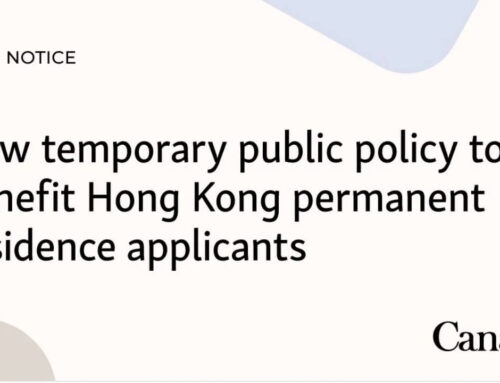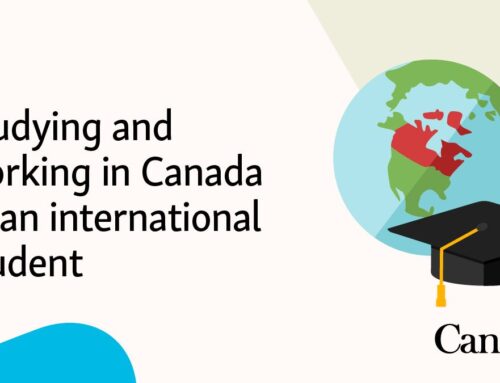IRCC sets cap on the number of study permit applications it will consider in 2024
Following Immigration Refugees and Citizenship Canada’s (IRCC’s) announcement on the 22nd of January, the department has also set a cap on the number of study permit applications it will consider in 2024.
Furthermore, according to ministerial instructions released by IRCC (see Canada Gazette, Part I, Volume 158, Number 5: GOVERNMENT NOTICES, the department will consider a maximum of 606,250 study permit applications in 2024). While the January 22nd announcement focused specifically on study permit approvals, the most recent cap, released on February 3, 2024, quantifies the number of new study permit applications.
With these new instructions, this means that IRCC will limit and only consider and evaluate a total number of 606,250 study permits over the next 11 months, regardless of the decision reached on each application.
The instructions go a step further, stating that this new cap on study permits accepted for processing may be “amended in accordance with any subsequent instructions the minister may provide.” This implies that if IRCC does not reach the 360,000 approved study permit application cap within the processing cap of 606,250 applicants, the minister may increase the latter number to do so if the minister provides further instructions. This means the minister may raise the new limits if IRCC fails to meet the initial cap of 360,000 approved study permit applications under the processing limit of 606,250 applicants.
How do these numbers compare to 2023?
Canada’s open government data portal indicates that 579,075 study permit applications were approved in 2023 (between January and November of that year). The total number of processed study permit applications by the department were 814,317, indicating an approval rate of 71%.
Compared to the numbers of approved and processed study permit applications in 2023, the limits announced in 2024 represent a significant decrease in both processing and approvals for study permit applications.
How will the new study permit cap be utilized?
The new cap on study permit approvals (360,000) will be allocated between Canada’s provinces and weighted by their respective populations. Accordingly, the provinces of Ontario, Quebec and British Columbia are expected to see the highest number of study permit allocations, as they are the three most populous provinces in Canada. However, these are also the provinces that will face a significant decrease in study permits. According to Minister Miller, Ontario will see a 50% drop in study permits. Currently, Ontario, which holds 39% of the Canadian population, will be allocated 39% of the total cap for new study permits. This decrease will also increase the number of layoffs of school personnel as the funding received by international students will no longer be available. So far, British Columbia is the only province that has public declared that it will have 83,000 of the national cap (this is not the actual allocation, which has not been finalized yet) for study permit applications for the year, of which 50,000 study permits could be issued. BC holds 14% of Canada’s population.
Cap and Provincial Attestation Letter
This new policy will be implemented through a system of attestation letters, wherein individuals applying for a study permit will need both a letter of acceptance (LOA) from their designated learning institution (DLI) of choice, as well as a provincial attestation letter (PAL) from the province where the DLI is located with their application. IRCC will return any application that does not include a PAL, unless otherwise exempt.
Based on these new ministerial instructions, attestation letters must be written and signed by the provincial/territorial government, confirming that the applicant has a space within that province or territory’s allotted study permit approval cap. This attestation will serve as proof that the student has been accounted for under a provincial or territorial allocation within the national cap. Provinces and territories have been asked to have a plan in place for issuing PALs by March 31, 2024. Further according to the ministerial instructions, attestation letters must contain an applicant’s:
Full name;
Date of birth; and
Address.
What we know so far about the new student visa rules
- Canada has effectively suspended processing of new study permit applications for undergraduate, college, and long-term language students, until such time as a new “provincial attestation” process is put in place by provincial and territorial governments across the country
- Study permit applications for K-12, master’s, and doctoral students – all of which are exempt from the cap – can still be processed at this time
- Short-term language students – those booking study programmes of six months or less – can also still continue with their study plans
- Under the new cap, provinces and territories will be allocated a share of a total national volume of study permit applications for 2024
- Provincial and territorial governments have already received a proposed cap allocation from IRCC, and discussions are ongoing to finalise those numbers and to determine how they will be further distributed among the Designated Learning Institutions (DLIs) in each region of the country
- Students enrolled in programmes delivered via public-private partnerships will no longer be eligible for post-graduate work permits (PGWPs) as of 1 September 2024.
- New limits will be placed on work permits for spouses of international students.
- That study permit applications will now need to accompanied by a “provincial attestation letter,” with provinces and territories expected to put mechanisms in place to provide those letters “no later than 31 March 2024.”
- Study permit applications filed before January 22nd will still be processed
- Students pursuing language training will not be subject to the cap as their programs are less than 6 months, and do not count under the cap, or require a provincial attestation letter
Post-graduation work permit (PGWP) update for graduates of master’s degree programs
In recognition that graduates of master’s degree granting programs are excellent candidates to succeed in Canada’s labour market and potentially transition to permanent residence, IRCC has made changes to the length of the PGWP, so that they have the opportunity to meet the required Canadian work experience in order to apply for their permanent residence.
Starting on February 15, 2024, a longer, graduates of programs that are at least two years in length at PGWP-eligible designated learning institutions are eligible for a 3-year PGWP, as are graduates of master’s degree programs less than 2 years in length, so long as they meet all other PGWP eligibility criteria.
The length of PGWPs for programs other than master’s degrees will continue to align with the length of the study program, to a maximum of 3 years.
PGWP eligibility for public-private partnership college programs
Some provinces allow public colleges to license their curriculum to be delivered by an affiliated private college. In these cases, students physically attend a private college, but graduate with a diploma from a public institution. Concerns have been raised with regard to the quality of education provided by these institutions, as well as the lack of sufficient student supports. The Auditor General of Ontario has also raised concerns about a lack of oversight into program quality and student services at these institutions.
As such, IRCC has made a change to restrict PGWPs for these institutions, anticipating that without the ability to apply for a PGWP, there will be a reduction in the number of international students enrolling in them.
Who is eligible for a PGWP after graduating from a public-private partnership college program?
- International students currently enrolled will remain eligible for a PGWP if they meet other program eligibility criteria.
Who is not eligible for a PGWP after graduating from a public-private partnership college program?
- New students enrolling in this type of program will not be eligible for a post-graduation work permit.
Changes to open work permit eligibility for spouses
In the coming weeks, eligibility for open work permits for the spouses and common-law partners of international students will be updated.
Who can get an open work permit?
- Eligibility is limited to the spouses and common-law partners of students in graduate (master’s and doctorate) and professional degree–granting programs only.
- Once these changes are in effect, spouses and common-law partners of international students seeking to extend their existing work permit will continue to be eligible under this stream.
Who will not be eligible for an open work permit?
- The spouses and common-law partners of international students in other levels of study, including undergraduate and college programs, will no longer be eligible for an open work permit unless they already hold an open work permit under this stream.
If you or your family members have any questions regarding the new study permit cap, please do not hesitate to contact us at The Poonah Immigration Law Firm. You can reach us by emailing info@poonahimmigrationlaw.com or by calling us at 678-978-5848.





